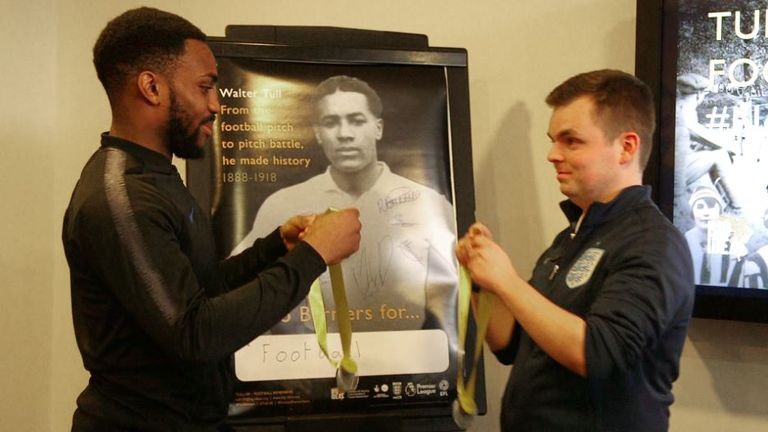Walter Tull's story still resonates 100 years on from his death

Monday 26 March 2018 08:36, UK
The amazing story of Walter Tull, footballing pioneer and war hero, is being remembered 100 years on.
"Through his actions, Tull ridiculed the barriers of ignorance that tried to deny people of colour equality with their contemporaries. His life stands testament to a determination to confront those people and those obstacles that sought to diminish him and the world in which he lived. It reveals a man, though rendered breathless in his prime, whose strong heart still beats loudly."
So reads the inscription on the monument to Walter Tull outside the Sixfields Stadium at Northampton, the words chosen by Tull's biographer Phil Vasili. Sunday marked a century since former Cobblers and Tottenham player was killed on the battlefields of the Somme during the First World War. Efforts are being made to ensure he will not be forgotten.
Who is Walter Tull?
Born in Folkestone in 1888 to a local woman and a Barbadian carpenter, Tull was just nine when he was orphaned and placed in a Bethnal Green children's home. A great success story, he impressed while playing for Clapton before signing for Tottenham in 1909 and becoming one of the first players of mixed heritage to play in English football's top flight.
When war broke out in 1914, Tull enlisted soon after, making history again in May 1917 when commissioned as an officer in the regular British Army, in contravention of the Manual of Military Law which stated officers must be of 'pure European descent'. He became the first person of black heritage to become an officer and lead his men to battle.
Speaking to Vasili, he summed it up neatly by saying that Tull "forced people through his actions to change, break and ignore the rules that attempted to make life difficult for people of colour". On 25 March 25th 1918, Tull was killed in action and despite the repeated efforts of his men, his body was not recovered from the battlefield.
Edward Finlayson, Tull's great nephew, said: "As a family we have always felt immense pride at Walter's sporting achievement and his evident courage in the First World War. As children some of us used to brag to friends about our great uncle, who had been a footballer. In more recent years we have been moved by the way in which Walter's story has been adopted as an inspiration to challenge inequality and discrimination."
Tull has not been ignored. Special coins were issued in his honour by the Royal Mint. There was even a theatre production of his life. But there is now a renewed effort to ensure he is posthumously awarded a military cross, a group of 127 MPs writing to the prime minister to argue that this "true British hero" should receive the honour denied him at the time.
Regardless of the success of that proposal, the 100th anniversary of Tull's death is not going unmarked. On Monday, the Tull100 project is launched.
What is the Tull100 project?
The project will award medals to those who make their communities more inclusive. Tull100 has "No Barriers" as its central message and will counter discrimination, promoting equality and inclusion irrespective of race, gender, sexuality, age or any other discrimination.
To earn a medal, young people need to hold an event with the No Barriers theme, reaching out to involve fresh faces from the community. Ideas include organising a football game, inviting special guests to share their experiences or even creating a Walter Tull mural.
The FA, Premier League and Football League are also backing the initiative. "I hope I'm doing my bit as chair of The FA's Inclusion Advisory Board, which oversees much of football's anti-discrimination work," said former player Paul Elliott. "In marking his centenary we have an opportunity to reflect on Walter's experience, success and sacrifice. We can reflect on ourselves, and above all honour his memory by standing up against discrimination today."









